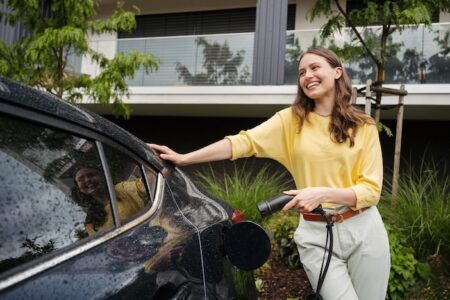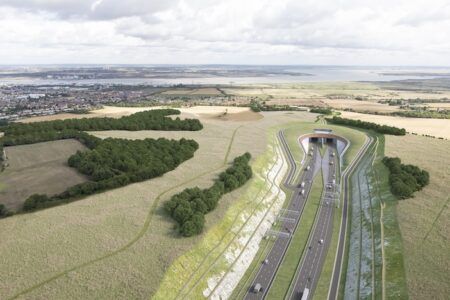A new smart charging project is incentivising large fleet operators to go electric; cutting carbon emissions, air pollution and energy costs. The EV Fleet-Centred Local Energy Systems (EFLES) project is aimed at optimising logistics companies’ growing electric vehicle (EV) fleets and demonstrating how
The project, set to begin on 1 May 2020, is spearheaded by UK Power Networks Services, the power distribution expert, alongside Moixa, the smart charging specialist, global logistics company UPS, the not-for-profit delivering positive change for London Cross River Partnership, and Innovate UK.
This project will show how Moixa’s GridShare artificial intelligence (AI) software can break down the barriers to electrification for global fleet operators by maximising the cost and carbon savings from EVs. GridShare will analyse hundreds of data sources at UPS’ Camden depot – including energy prices, power demand and the weather – to optimise EV charging, as well as power supply and demand in order to demonstrate how to effectively cut costs. Vehicles will be able to charge when power is cheapest and cleanest by, for example, using onsite energy storage and solar at the most cost-effective times.

“Our ever-growing online shopping rates mean we’re delivering more things than ever before – everything from food shopping to medical supplies – and that’s having a big impact on carbon emissions and air pollution in our cities. Mitigating these impacts is a massive challenge but this project shows how with the help of the AI powered technology, like GridShare, the world’s biggest fleet operators can go electric and achieve their environmental ambitions,” says Simon Daniel, CEO of Moixa.
There are more than five million vans, trucks and buses on UK roads, responsible for millions of tonnes of carbon emissions every year. By 2040, 87% of these are expected to be electric and this project will show how fleet operators can integrate smart charging, onsite storage and renewables to manage this transition in a cost-effective way.
In addition to managing smart charging of EVs, Moixa’s GridShare software can manage onsite energy assets like solar PV and energy storage, including second life batteries from retired EVs that can unlock new value for fleets. The project will also assess how a site’s electricity demand can be flexed to balance power on the local network.
Logistics experts
UPS will provide its expertise in fleet operation and act as a testbed to demonstrate the business case for AI-led local energy systems, providing a blueprint for other global fleet operators to follow. In January 2020, UPS announced a commitment to buy 10,000 tailor-made electric vans from UK start-up Arrival. UPS also took a minority stake in the company, demonstrating its commitment to decarbonising its fleet. The Camden site will be used to develop and test the system, as well as to illustrate the business need for this innovative solution that is helping to break down the barriers surrounding large scale transitioning to EV fleets.
Claire Thompson-Sage, Sustainable Development Coordinator at UPS, says: “As leading experts in transport logistics, UPS champions alternative energy use. We have the global expertise, smart-charging infrastructure and resources to host this first-of-a-kind testbed at our Camden facility. This project will build on our EV infrastructure technology to help develop a holistic local energy system. We are proud to spearhead such an exciting smart-grid project and look forward to taking it to the next level by making it even smarter.”
Meeting emissions targets
Cross River Partnership will assess how these technology solutions can deliver London’s aims to improve air quality, unlock job opportunities and deliver energy, cost and time savings for businesses in the UK and internationally. The project builds on the Smart Electric Urban Logistics trial from 2017-19, which saw CRP, UPS and UK Power Networks develop new charging technology at the Camden depot, to overcome the challenge of charging an EV fleet without a costly upgrade of the local power network.
“We are delighted to partner with UPS, Moixa and UK Power Networks Services on this truly innovative project. We are proud that London is again the location for testing new technology that supports clean growth and greener transport. This collaboration is testament to our longstanding commitment to working in partnership to deliver and share new ways of addressing the challenges we face with innovative solutions,” says Susannah Wilks, Director of Cross River Partnership.
Preparing the grid
One of the key challenges to the electrification of transport is the capacity of local power networks to deliver charging. Power infrastructure is becoming increasingly constrained and network reinforcement can be costly. Smart charging can help by shifting demand to less constrained times, alleviating pressure on local networks and avoiding costly network upgrades.
Philip Heathcote, Head of Markets at UK Power Networks Services, says: “We are delighted to continue partnering with UPS and Cross River Partnership to deliver this innovative project with Moixa that will provide further data and insight into how we can get more electric vehicles on the road in the most efficient and cost-effective way.”
Having implemented UPS’ smart charging solution, UK Power Networks Services will continue its partnership with the global logistics company and work with Moixa to support the installation of new local energy system software into the existing framework. The company will also develop a commercial framework that will analyse the feasibility of the solution and work in collaboration with UPS to identify technical and commercial specifications unique to the company’s Camden centre. This specification will be implemented into Moixa’s software to ensure an efficient, reliable and low-cost smart charging solution in London.





